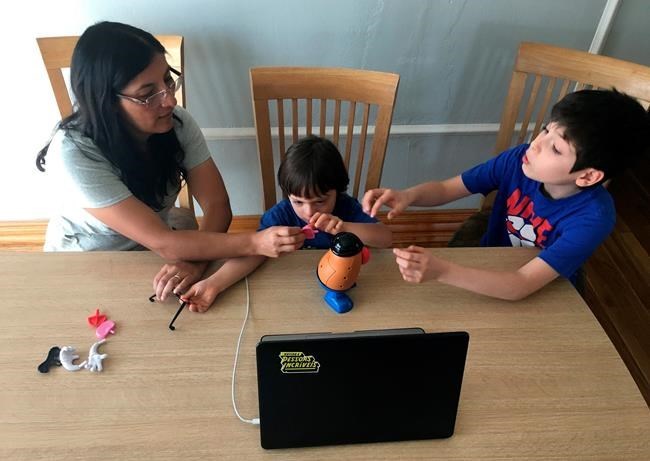
In this May 21, 2020, photo, Pablo Prengaman, center, practices recognizing and verbalizing body parts while building a Mr. Potato Head with the help of mother, Lorena Prengaman, and brother Lucas Prengaman, during a speech therapy session via Zoom in Phoenix. Pablo, who is 4 years old and has Down syndrome, has been doing online speech and occupational therapies since March because of the coronavirus pandemic. (AP Photo/Peter Prengaman)
May 29, 2020 - 5:43 AM
PHOENIX - The speech therapist held up a book of animals. Our 4-year-old looked curiously at her across the Zoom call screen.
“Beig! Beig!” Pablo suddenly shouted, pointing at a pig.
It was the first time I had heard Pablo say an approximation of an animal name. It was a huge accomplishment for a kid with Down syndrome who struggles with speech.
In early March, fear over how the virus could impact Pablo pushed us to pull him from therapies. Then the clinic closed altogether. When his therapists began offering online sessions, my wife and I declined. We figured online therapy would never work for such a young child with special needs.
After a few weeks, when it became clear there would be no in-person therapies for the foreseeable future, we decided to try a few speech therapy sessions. Pablo already has many developmental strikes against him, so we decided that, until things got back to normal, anything would be better than nothing.
Two months and many therapies later, I don’t think we ever want to go back to “normal” when it comes to therapy.
The biggest difference between clinical and online therapies is the involvement of the family. In a clinic, the child goes into a room with a therapist while mom or dad sit in the waiting room. This partly because children get distracted and want the attention of parents. And for parents, there is an advantage: a 30- to 45-minute respite from parenting's rigours.
But there are two big disadvantages.
First, parents have to get kids to therapy. This is rarely talked about but one of the biggest challenges of raising special needs children (never mind that most insurance companies only cover a fraction of the therapies needed and the gaps have to be covered out-of-pocket). A few years ago, at one point my wife and I were taking Pablo to five therapies a week. It was exhausting, and we realized it wasn’t fair to Pablo’s older brothers, who have a right to their own extracurricular activities.
Second, at a clinic parents don’t typically see what the therapist is doing or how their child is reacting. At the end of the session, the therapist will give a one-minute rundown of how it went and suggest exercises at home before rushing off to the next patient. That's not the same as being part of the therapy — and actually learning techniques that can be reinforced at home.
That isn’t to say participating is easy.
Now, my wife and I sit on each side of Pablo during his sessions. He will frequently try to get up, pound on the computer buttons or touch the screen. But between all that, he makes approximations of words for colours, cars, trains and animals as he interacts with the therapist and does activities like build blocks or construct Mr. Potato Head.
Here's what this means: He has made more progress than we have seen before.
Recently, as Arizona begins lifting restrictions, Pablo’s therapist asked if we want to return to the clinic. We told her no. Yes, we are still concerned about the virus. But even if we weren’t, we want to keep exploring online therapies. They've been working so well.
As I reflect on Pablo’s progress and our evolution in thinking, I realize something: For all the misery that coronavirus has caused, it’s probably also creating disruptions like ours in many people’s lives — disruptions that reveal something positive we never expected. Once you’re forced to forge a new path, you may realize the new way is better.
___
Virus Diary, an occasional feature, showcases the coronavirus saga through the eyes of Associated Press journalists around the world. Follow Peter Prengaman, AP's news director for the western United States, on Twitter at http://twitter.com/peterprengaman
News from © The Associated Press, 2020